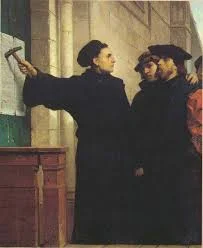499 years ago, Martin Luther - a young Catholic Monk - posted 95 theses on the door at Wittenberg. This single act began the Protestant Reformation, changed the landscape of Europe, the direction of Christianity, and was an undercurrent that lead to democratic movements across the globe. Extraordinary things happen from such an ordinary act.
Often, images of this event portray Martin Luther as a leading academic respected among his peers, other images depict a Luther who is a leader of the peasantry. However, these first two images (below) miss something - Church doors were neighborhood bulletin boards - event announcements, issues for debate, and probably even a request for a new roommate would make their way onto the board.
The reality of Luther's initial act is that it wasn't revolutionary. It was pretty ordinary for an academic to post some conversation starters. Luther also wasn't the first person to challenge Papal authority from a position of theology. As advocates, we follow in the footsteps of Luther. Advocacy is the very simple and ordinary act of speaking out, and these ordinary acts may have an extraordinary ripple throughout our world.
HERE ARE THE FIVE STEPS TO BECOME A REVOLUTHERANARY
- Identify an issue that concerns you.
Martin Luther was concerned about the selling of indulgences. He saw it as bad theology and exploitation of the most vulnerable. - Educate yourself on the issue.
Luther saw the inter-connectedness of issues. He saw the need for economic stability, literacy, and better theological education of clergy. Through these things, Luther believed that the the exploitation of worried souls wouldn't be able to occur if people could read scripture and understand their theology for themselves. - Develop a plan of action. Take your issue to those who can create change.
Luther developed a plan. He wanted to lift up the issues where he saw corruption so he wrote down his concerns and posted them for debate. He was willing to stick with his beliefs for the long haul, and was even prepared to go before the hierarchy of the church and society. - Engage in dialogue.
Luther did not just shout his own opinion, but he was willing to work with others and engage in discourse with those who disagreed with him. He specifically answered their charges in many of his writings. Dialogue, compromise, and discourse are necessary for a civilized world. - Here we stand, we can do no other.
While Luther engaged others, he didn't sacrifice his position - famously saying "Here I stand and I can do no other" - refusing to recant his positions. It lead to his ex-communication... and a revo-LUTHERAN.




